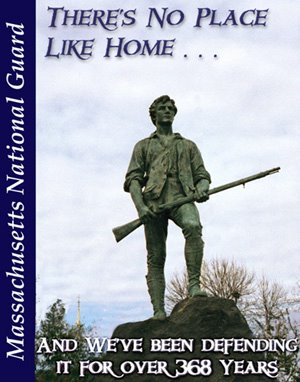 Back in January I noted a lawsuit was filed concerning the denial of per-diem payments to members of the Massachusetts National Guard for duties performed in relation to maintaining infrastructure security in the wake of the 9/11 terrorist attacks. (See “Massachusetts Guardsmen seek pay for post-9/11 duty”)
Back in January I noted a lawsuit was filed concerning the denial of per-diem payments to members of the Massachusetts National Guard for duties performed in relation to maintaining infrastructure security in the wake of the 9/11 terrorist attacks. (See “Massachusetts Guardsmen seek pay for post-9/11 duty”)An amended suit has been filed in U.S. District Court that states that Massachusetts Guard officers deliberately refused to pay the travel-related expense (food, mileage and lodging) as a way to cut costs.
The amendment to the suit relies on testimony from a source, presumably within the Massachusetts National Guard itself that the decision was deliberately made to tell soldiers that they could not request reimbursement; because there was insufficient funding budgeted to the efforts, and not an oversight or (apparent) directive from the Pentagon. However, because the National Guard units of the states are part of the U.S. Armed forces, Secretary of Defense Donald Rumsfeldt is also named as a defendant in the suit.
From an AP article:
A confidential informant alleges in legal papers being filed in court today that the man who now leads the Massachusetts National Guard chose not to pay basic expenses for soldiers called to duty after the Sept. 11 attacks because of budget constraints.The amendments to the suit also seek to increase the number of Guardsmen estimated to be affected, and to increase the expected shortfall to soldiers from $73 million to an estimated $100 million. A more troubling amendment to the lawsuit is that some members of the Guard were told that the reimbursements had been discontinued (which is not true) and that if they continued to complain they would be discharged from the Guard. Some of those members were also told that they signed a document saying that they waived the reimbursement payments they would be able to remain in the Guard. Some signed, but never received copies of the signed form, and are still being denied reimbursement.
The allegation against Brig. Gen. Oliver Mason is part of an amended complaint to be filed today in U.S. District Court in Boston. Attorney John Shek [representing the Guardsmen who initially filed suit] said it was made by someone who came forward after Shek filed a class action suit in January against the state and federal governments.
//snip//
The amended complaint does not name the informant. Shek described him yesterday as a person with knowledge of the "inner workings of the accounting offices of the Massachusetts National Guard."
Shek said the informant requested anonymity because of fears about a loss of employment, and that he would seek to keep the informant’s name from the court record.
According to a statement by the informant, the decision not to pay the "was not an accident or a mistake."
"It was a conscious decision on the part of Col. Oliver Mason with the assistance of his NCO, Sgt. Major Stroscio," the statement reads. "In the wake of the 9-11 attacks, Mason knew he had more security taskings than he had money to support them."
Also from the AP article:
A National Guard spokesman, Major Winfield Danielson, said because of the ongoing legal case he could not directly respond to the allegation about Mason, who became head of the Massachusetts National Guard last April. But Danielson said the Guard’s funding decisions are based on the needs of the mission, not saving money.In the field, some of the Guardsmen were working alongside other members of the Guard whose units had been federalized, and who had been getting paid.
Danielson said it’s a priority for the Guard to make sure its members are fairly compensated. "If we don’t, they’re not going to stay”, he said.
Danielson said the Guard began an internal audit last May after receiving complaints about reimbursements from soldiers. The reimbursements vary depending on the security mission. Danielson declined to comment on the audit because it’s not complete.
Under federal law, military personnel are entitled to meals and travel allowance while away from home on active duty. But according to the lawsuit, Massachusetts guardsmen received orders that read: "Government quarters not available; ... government meals are not available; ... per diem: not authorized."
As a side note, this issue could be a sharp thorn for first-term Massachusetts Governor Mitt Romney, who is expected to see the GOP nomination for U.S. President in the 2008 election cycle, and has already declared that he will not seek reelection as Governor. As Governor of the Commonwealth of Massachusetts, Romney is the Commander of the Massachusetts National Guard. It is certain that this will be used, by both Democrats opposing Romney and those within the GOP who wish to promote their own candidates for the Presidential nomination.
I'm gratified to see that there was an audit begun in May of 2005 over the complaints of
denied reimbursements. Of course, the questions now are(and I *always* have questions):
-- why, after 9 months the audit is still not complete,
-- did the Guard notify any of the soldiers being denied reimbursement that an audit was happening
-- Why didn't the Guard inform all involved, when the lawsuit was filed in January, that the audit
was happening?
----------------------------------------------------
Links –

No comments:
Post a Comment